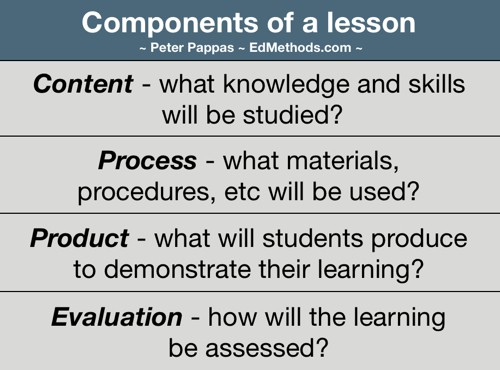I introduced a modified lesson study model. As I noted:
The goal of this assignment is two-fold. First to offer supportive feedback on your lesson development through a peer review process. Second to offer some “lenses to look through” that help you easily see the essentials of a lesson. It is not a substitute for the School of Education lesson plan format. Think of it as a pre-lesson plan planning guide. This is not some exercise for the benefit of your instructor. This should be a process that works for you. So feel free to modify to meet your particulars. Use a scale that works for you – focus on just a small segment of a larger unit, or look at the entire unit. Don’t like Bloom? Use another schema to discuss the kinds of thinking that your students will need to successfully complete the assignment. Assignment here. (41 KB pdf)
Next I used a presentation and LearningCatalytics questions to lead the students through a series of activities as participant / observers. I wanted them to look at the lesson from the students’ perspective with a focus on the four components of a lesson. I also wanted them to use Bloom’s Taxonomy to see if they could identify what level of thinking they were using. We monitored the extent the decisions about of content, process, product and evaluation were being made by me (the teacher) or by the students. Slide deck here. (6.4 MB pdf)
When I asked them to summarize what they thought my goal was for the class, one student replied “You wanted to get us to think about thinking by having to think.”


Great way to outline a lesson or a unit. The guide gives structure while being flexible. I’m going to try my hand at it this week for an overarching look at my work sample unit!
Good, make it work for you. As I became a more experienced teacher, I developed my own methods to plan and monitor the effectiveness of my lessons.
While I tracked content-based lessons, I was especially interested in skill-based ones. For example if you get good at structuring an effective student discussion group, you can use it in any course.